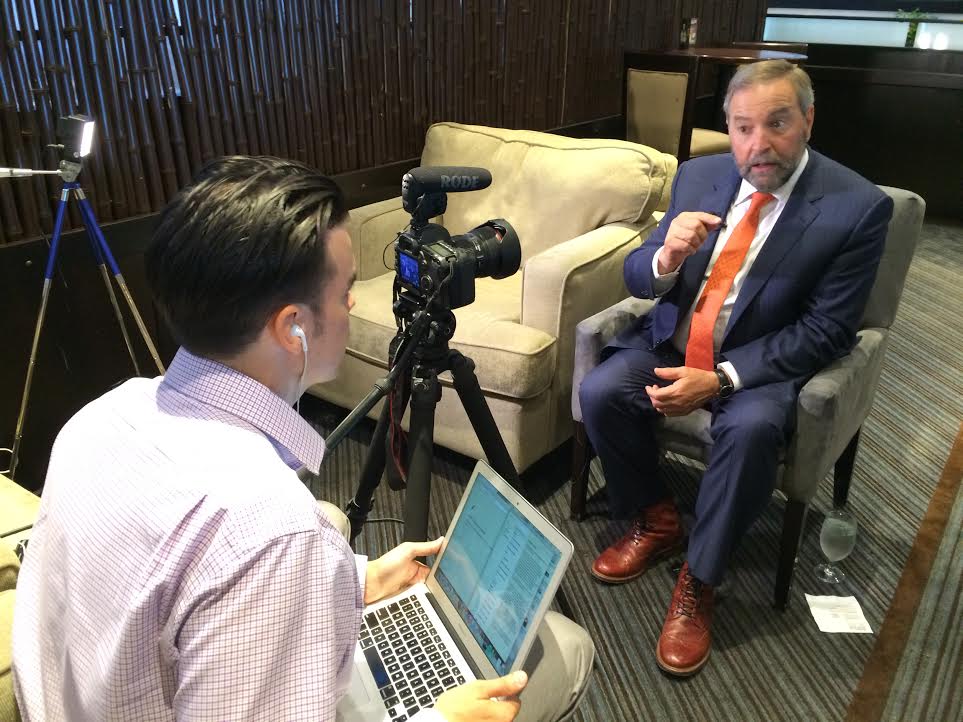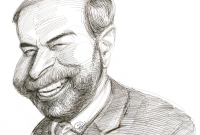Support strong Canadian climate journalism for 2025
Despite losing ground in the national polls, the NDP say they are still in it to win it.
Tom Mulcair and his entourage have flown 32,000 km across Canada, booked 1,500 hotel rooms, helicoptered over Niagara Falls, and floatplaned into a Kenora, Ontario-area First Nations meeting. The leader has been to the Arctic, Vancouver Island, and Newfoundland, and 45 cities and towns in between.
The 60-year old is up a the "crack of dawn," does early morning media interviews, and hits daily public events that have so far drawn 37,000 people, by the NDP's count.
“Tom Mulcair feeds off the crowds," says a still-upbeat NDP senior campaign advisor Brad Lavigne from Ottawa on Wednesday. "It’s going to be a sprint to the finish line.”
But will all the efforts in the next 10 days be enough to put Mulcair in 24 Sussex?
National polls suggest he's losing that battle after a spectacular rise this summer. Conversely, Liberal fortunes are soaring. Justin Trudeau is now predicted —for the first time in this election—to seize a possible narrow minority government victory over the Conservatives. And it's not over yet.
Still, the man responsible for NDP's strategy says, not so fast. Lavigne says New Democrats are about to launch their best financed “ground game” in the party’s history; the niqab issue will soon dissipate in Quebec; and the NDP will steal Conservative ridings hard hit by the Trans Pacific Partnership trade deal —or so the spin goes.
Here’s the National Observer's Q+A with Brad Lavigne on what the NDP will do in the final days of the campaign.

Q: How does the NDP bounce back from its August high of 37 per cent in the polls to just 24 per cent today?
A: “First — the softening of the numbers in Quebec is directly related to the debate on the niqab. Over the last handful of days, we’ve been successful in reminding Quebecers that the ballot question is defeating Stephen Harper. And the best and only vehicle to do that is to vote NDP.”
“Over the last number of days, we’ve seen tremendous success in regaining support from those that were discussing the niqab issue. As that issue fades, those supporters come home.”
NDP's ground game: best financed in history
“Our ground game will be the most aggressive and well resourced in our party’s history. As each day passes, we are securing more and more people in seats in which the NDP has been targeting, to lock in and support the NDP. For example in B.C., there are a number of seats —all Conservative —where the NDP have the only credible chance at defeating them.”
“Another issue is... the Trans Pacific Partnership. Just a short while ago, Hillary Clinton voiced her opposition to the TPP. She cited the fact that it didn’t meet her high bar for the price of prescription drugs, which is precisely what Mulcair has been talking about.”
“We’ve been building support for our concerns over TPP —that issue will remain at the forefront of our efforts... This is a trade deal that’s going to have a downward pressure on wages, increase the price of prescriptions, to say nothing of what it will do on auto and dairy sectors.
“We’re certainly going to be asking —who do they trust going forward when it comes to the trade deal? Stephen Harper or Tom Mulcair, who is going to fight for jobs and lower prescription costs?”
Q —Conservatives likely want to fight the closing days of the election on the economy. Do you think a trade deal will be the topic that will re-ignite voter interest in the NDP?
A: “I believe it already has. If you take a look at Mr. Mulcair’s tour in southwest Ontario on Sunday, and in dairy country on Saturday. It does help focus people’s attention. We’re talking about people’s livelihoods here. Their jobs, way of life —for some dairy farmers, they have multiple generations of ownership. For them, this is is top of mind issue."
"If you go into those ridings where the auto sector is important, those are all Conservative seats... So whether it’s London, Essex, Brantford, Kitchener or Sarnia —those are all Conservative seats. It’s a way to go right into the Conservative heartland, where in Southwest Ontario, they’ve already lost 400,000 manufacturing jobs."

Niqab: an issue of distraction and division
Q - How frustrating is it to see the niqab issue become so dominant —especially for you, planning this election for a couple of years, all the work gone into it, to see this peculiar, relatively minor issue affecting a small number of people become so large in the campaign?”
“It’s one of the challenges that come from a governing party that campaigns on issues of distraction and division. This policy has affected two people in the province of Quebec. Today, Conservatives want to ban the niqab for the federal public service, where there are zero people in the public service where the niqab faces the public."
"It’s a classic example of how Conservatives have the ability to distract Canadians that affect them in their daily lives on to other things. One just needs to maintain their focus, and make sure the issues on which you’re fighting the election campaign is relevant to people's daily lives. This is not the first time the Conservatives have used distraction as a technique. But it needs to be challenged, and fought.”

Q —You mentioned how strong your ground game will be — the most resourced ever for the party. Two part question —what is that ground game? As for the NDP supporters getting depressed by the polls, what message do you have for them?
“The NDP has never been closer to forming government as it is in this election campaign. The NDP has an incredibly efficient vote which means we can win everywhere in the country, and we have a leader who has experience and is ready for the job."
"The incumbent advantage cannot be understated. We came into this election with 95 MPs —that means we only need about 35 more seats to defeat Harper. The Liberals need over 100 seats to defeat Stephen Harper. So our path to victory is the shortest.”
“At this time of the election campaign in 2011, we were tied with the Liberals at 25 per cent. With 11-12 days to go, a lot of that momentum we’ve been building over the last eight months, if we can get that momentum into the ballot box, we’ll do very well.”
Q —Commentators have said that some of the NDP’s slide has to do with Mulcair’s performances in the debates —his style was laid back, while Trudeau's was combative. What's your reaction?

“This was Mulcair’s first time at doing a federal leaders’ debates. Because of Mulcair’s strong performance in the House of Commons in question period, some commentators were then looking for that same style in the debates. The problem with that analysis is that they are fundamentally different formats."
"Mr. Trudeau had incredibly low expectations, and so he quite easily exceeded them. Mulcair, in each of the debates — and particularly in the French ones — came across as a Prime Minister. Someone who had a command of the files, and a strong grasp of the issues and a plan for taking Canada forward. So Mulcair came across as a Prime Minister, while Harper played defence, and Trudeau, by merely showing up and not making major mistakes, exceeded the media’s expectations.”
Pipeline politics
Q —Mulcair says he would replace Canada’s pipeline review process. Then you see NDP candidates like the one in Fort McMurray who is supportive of the oil sands, wearing an ‘I love oil sands' t-shirt. Do you feel the NDP’s position has been sufficiently clear on oil development?
"Yes, crystal clear and has been consistent since day one. There is a need for Canada’s resources to get to markets. I don’t think there’s anyone who would debate that question. The question is how. And what form does it take?"
"Under Stephen Harper’s assessment, they’ve been gutted so badly that many projects including Kinder Morgan (Trans Mountain pipeline expansion) and Energy East have failed to build social licence."
"Mulcair has been very clear that he would never approve a pipeline under Mr. Harper’s assessment process. It doesn’t matter if it’s well known like Kinder Morgan or Energy East —none of them can be approved under rules that have been drafted by Mr. Harper."
"That’s why you have such fierce opposition to some of the current pipelines. People feel excluded. There are municipalities in the lower mainland [of B.C.] who haven’t been heard. In rural Quebec, communities and mayors are up in arms for other issues as well because of the inadequacies of Mr. Harper’s assessment.”







Comments